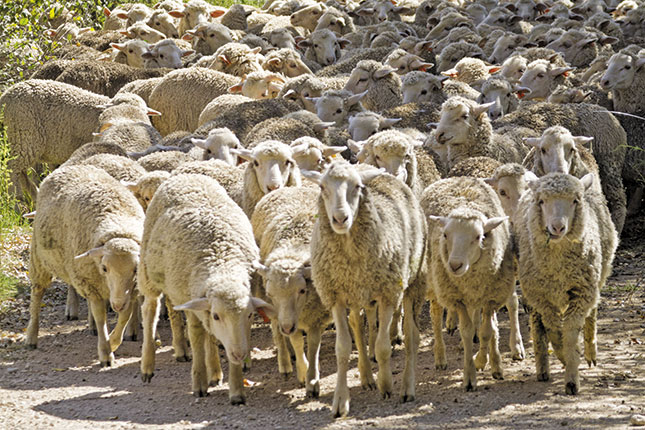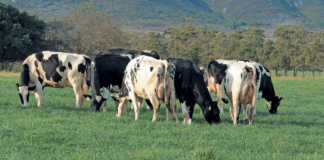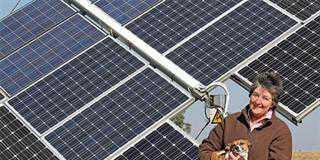
Farmers thought agricultural economist Prof Eckart Kassier was out of his mind when, in 1994, he predicted that in 2014 only 30 000 of the then 60 000 South African farmers would remain in business. This is one-tenth of the number of farmers on the land in the 1960s. Kassier’s prediction was correct, and according to Braam Coetzee, managing director of breeding association Konsortium Merino, these numbers could dwindle to 7 000 over the next decade.
READ:Mixed reactions from agri-leaders to SONA 2017
He was speaking at a dinner where the breeding association announced its strategy for ensuring that its members would be among those 7 000 farmers.
Size counts
Coetzee identifies economies of scale as the primary reason that farmers today struggle to survive, and this is echoed by John Luscombe, executive director of Konsortium Merino. In his opinion, farming with sheep on a 5 000ha farm in the Karoo might have been sufficient a few years ago, but it is no longer economically viable.
“You need to have at least 10 000ha if you want to stay in the game. And over a few years, that too might not be enough,” he says. As a breeding organisation, Konsortium Merino is no exception. Over the years, the organisation’s members have produced quality wool and meat, says Coetzee. He cites one of its members from Victoria West in the Northern Cape taking first place in a blind tasting at the World Merino Congress in Stellenbosch earlier this year.
But the group does not have sufficient volume to ensure consistent supply, and is therefore losing out on market opportunities. According to Coetzee, however, this is due to change soon, as Konsortium Merino has developed a strategy to grow its combined flock to 500 000 ewes by 2025. It also aims to establish a Konsortium Merino brand, so that its meat and wool will not lose its identity along the supply chain.
Ewe units
The strategy’s first phase involves a new way of ‘owning’ sheep, says Coetzee. Konsortium Merino will lease land, and sheep will be farmed on a large scale. To finance this expansion, those involved will be able to buy shares in the operation in the form of ewe units. A ewe unit is defined as a ewe between one and five years old, with less than three months of wool. It is not a stud ewe and is able to reproduce.
Unit owners will share profits and enjoy the same tax benefits as farmers. This will allow people who are not farmers to become involved in agriculture. It will also offer existing farmers a means to expand production, an ideal solution for
farmers struggling to expand production due to land constraints, according to Coetzee. Investors will have to buy at least 10 units at a time for a minimum term of three years, as that is the minimum length of farm leases. After three years, investors can sell or keep their shares, or exchange them for real sheep.
There is an exit clause for those who want to sell their shares earlier, but this will involve a fine. At present, the value of a sheep unit is R1 284. Farmers will share in profits of meat sales, amounting to 4kg of meat per unit. Coetzee
estimates that this will result in growth of 6,5% to 7% of the value of the ewe unit, adding that the price of ewes has grown steadily between 10% and 12% per year over the past forty years.
“Total growth of an investment can easily amount to 16% to 17% a year,” he says. Coetzee claims that because Konsortium Merino understands sheep farming, the strategy is a superb business opportunity. The group currently leases about 100 000ha of land, with 26 000 ewe units valued at R37 million under its management.
Co-operatives
To incorporate farm workers, the group has proposed farm workers create co-operatives of at least five members each.
Willi Jonker, a chartered accountant from asset manager Interneuron and involved with Konsortium Merino, told Farmer’s Weekly that co-operatives must apply for funding from the Department of Trade and Industry (dti), and use it to buy units. According to him, the dti provides up to R350 000 per co-operative.
In addition to creating opportunities for farm workers, a strategy has been created to empower emerging farmers.
“Commercial farmers are leaving the industry as fast as government is trying to push new farmers into it,” Coetzee says. “We as farmers will have to make land reform work if we want to secure a future for ourselves in this country.
Konsortium Merino will make sheep available to these farmers to contribute to successful land reform.” Jonker identifies poor access to finance as one of the primary obstacles to land reform. “Government is not transferring land to new entrants. Without land ownership, these farmers are unable to access loans to start or expand production,” he stresses. Konsortium Merino aims to supply beneficiaries with physical ewes in return for a 70% accrual of capital.
“The breeding group has a strong base of extension officers who will teach farmers the ins and outs of sheep farming to
guarantee their success. The farmers basically only have to ensure they don’t lose the sheep.” Jonker adds that the new farmers will be able to build up a commercial-sized stud within five years.
Konsortium Merino plans to open feeding lots and abattoirs so that the group will attain ownership over the sheep
produced by emerging farmers, ensuring a high-quality product. According to Luscombe, the group has been
involved with clinics and schools on a small scale, but the new strategy will enable it to make an even greater social contribution.
Phone Konsortium Merino on 082 307 6921 or email [email protected].
This article was originally published in the 14 November 2014 issue of Farmer’s Weekly.













